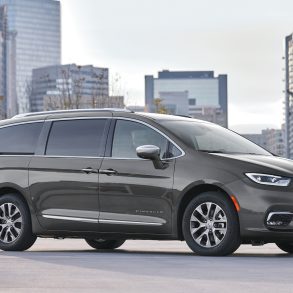 Condemnation directed at the Detroit Three is running rampant. “They build the wrong vehicles”, says America. “New leadership is required,” say the analysts. “Why not sell us their better Euro-market cars?” inquires the umm…. auto bloggers.
Condemnation directed at the Detroit Three is running rampant. “They build the wrong vehicles”, says America. “New leadership is required,” say the analysts. “Why not sell us their better Euro-market cars?” inquires the umm…. auto bloggers.
Valid points; these are, with a few problems. General Motors, Ford, and Chrysler may build the “wrong” vehicles, but Americans still buys plenty of them. In fact, only in recent years has the Detroit Three’s hold on the majority of their domestic market fallen away. No, that’s not good news, but perhaps we should all stop acting like General Motors, Ford, and Chrysler don’t sell any cars whatsoever.
And while we accuse the Detroit Three – especially Chrysler – of being too truck-heavy in their offering list, let us remember that selling a bunch of $13,487 Calibers in Canada isn’t likely as lucrative as selling a handful of Rams at a $10,000 discount. Sure, that’s not an appropriate long-term view, and it is in long-term perspectives that the Detroit Three has been found wanting, but still…. GM, Ford, and Chrysler were manufacturing the vehicles Americans wanted and making serious coin doing so. For a while.
As one-shot contrarian examples show, what analysts called for wasn’t always the answer. Everybody was excited to see the Opel Astra heading across the Atlantic to become the Saturn Astra until we saw the price that GM needed to set in order not to lose money. Of course, furthering that argument is a third point that says Honda can build a better car and sell it at a better price soooo; why can’t GM?
Don’t get me wrong, I’m not defending the Detroit Three’s short-sighted views on trucks and SUVs. I just can’t cease to wonder at America’s collective hatred for Detroit’s business methods when America collectively supported those business methods. Judging by polls that suggest American citizens don’t want to throw good money after bad in Detroit’s direction, I also wonder why so many Americans are willing to see large chunks of their friends and family lose their jobs.
Acknowledging that GM’s business models were – and perhaps continue to be – terribly reactionary and overwhelmingly astigmatic, one must also wonder if any federal rejection of aid is the complete opposite in a negative praxis. It’s wonderful to act wise and suggest that throwing billions more dollars Detroit’s way wouldn’t be good for future generations and likely wouldn’t help for long anyway, but that wisdom comes at a cost: jobs, jobs, jobs, and more jobs.









First time visitor – won’t be my last time by. You’ve got some nice thoughts here.
I think the answer to the save-Detroit/hate-Detroit paradox you’re pointing out is that America is decidedly schizophrenic on the issue.
You’re right to point out that many Americans have bashed Detroit mercilessly for giving the people what they bought in droves. These are largely the same people who are bashing out the investment banks, mortgage banks, and mortgage brokers for lending money irresponsibly; these are the same people bashing home buyers who bought way more than they could afford with no money down and adjustable interest-only loans. In other words, these are the people who believe in sustainable, long-term decisions even if it means some amount of short-term sacrifice.
Then, there are the many Americans with much shorter time horizons. When there’s a money trail, they follow it, regardless of whether it leads them over a cliff. As long as the times are good, let the good times roll. Imagining change, planning for change, expecting change, adapting to change, hedging your bets in case things change, especially during times of comfort, these are not things this segment of Americans – no matter how “hard working” in the day-to-day sense they might be – work hard enough to think about and structure into their plans.
So where does that leave us with respect to a bailout?
We cannot just provide more taxpayer capital without strings; also, we must be clear before we provide any taxpayer capital what exactly the conditions are under which we would let GM fail if the current bailout doesn’t work, lest this become the first of many bailouts. At some point, it does become too costly to allow companies and industries to fail.
It seems to me Ford is furthest along the right track; GM needs to be the major focus; perhaps we let Chrysler fail and/or have its pieces picked up out of bankruptcy by other companies – is it by itself really worth saving?
And if were up to me, bailouts would only come with agreement to specific sweeping changes, especially executive leadership. The boardroom must be swept and replaced with new, more accountable and outspoken leadership, including provision for a certain number of board seats to be appointed by Congress until certain financial/operating milestones are hit. There must also be GAO oversight at the board level and independent oversight of some sort at the operating level, a no-golden-parachute housecleaning at the top levels of executive management, restructured comp plans for new executives, a consolidation and selloff of some brands, and an operating plan for profit for each remaining brand approved by the new board and independently audited.
As much as having direct government control is a far cry from a guarantee of smart executive decisions and improved company performance, I cannot support taxation without representation in either public or private affairs.
Want a government bailout? Make room for government in the boardroom. You can’t have a free lunch and eat it, too.
Righty-o Mark. Seems to me that the best trade-off for receiving money would be for GM to give up, say, 10 or 20% of control. If the company sinks, the government threw away money. If it rebounds, the government(and therefore taxpayers) are earning revenue. If money’s going to be given, the government needs to get something back for it more than just job security.